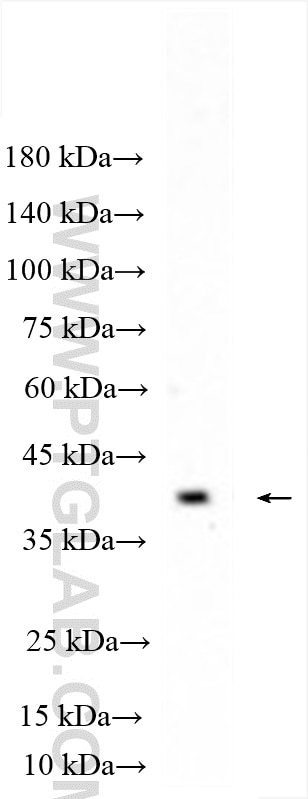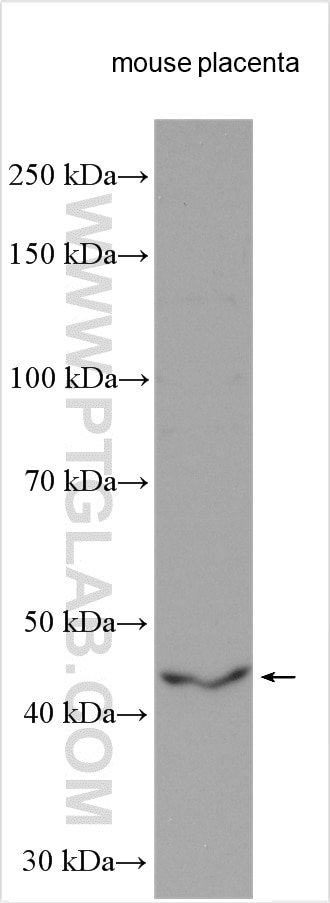Tested Applications
| Positive WB detected in | human placenta tissue, mouse placenta tissue |
Recommended dilution
| Application | Dilution |
|---|---|
| Western Blot (WB) | WB : 1:500-1:1000 |
| It is recommended that this reagent should be titrated in each testing system to obtain optimal results. | |
| Sample-dependent, Check data in validation data gallery. | |
Published Applications
| WB | See 2 publications below |
| IHC | See 2 publications below |
Product Information
22189-1-AP targets HTR1B in WB, IHC, ELISA applications and shows reactivity with human, mouse samples.
| Tested Reactivity | human, mouse |
| Cited Reactivity | human, mouse |
| Host / Isotype | Rabbit / IgG |
| Class | Polyclonal |
| Type | Antibody |
| Immunogen |
CatNo: Ag16753 Product name: Recombinant human HTR1B protein Source: e coli.-derived, PET28a Tag: 6*His Domain: 228-315 aa of BC096207 Sequence: YGRIYVEARSRILKQTPNRTGKRLTRAQLITDSPGSTSSVTSINSRVPDVPSESGSPVYVNQVKVRVSDALLEKKKLMAARERKATKT Predict reactive species |
| Full Name | 5-hydroxytryptamine (serotonin) receptor 1B |
| Calculated Molecular Weight | 390 aa, 44 kDa |
| Observed Molecular Weight | 40-44 kDa |
| GenBank Accession Number | BC096207 |
| Gene Symbol | HTR1B |
| Gene ID (NCBI) | 3351 |
| RRID | AB_2879020 |
| Conjugate | Unconjugated |
| Form | Liquid |
| Purification Method | Antigen affinity purification |
| UNIPROT ID | P28222 |
| Storage Buffer | PBS with 0.02% sodium azide and 50% glycerol, pH 7.3. |
| Storage Conditions | Store at -20°C. Stable for one year after shipment. Aliquoting is unnecessary for -20oC storage. 20ul sizes contain 0.1% BSA. |
Background Information
HTR1B, also known as 5-HT1B, 5-HT1DB, HTR1D2, HTR1DB, and S12, belongs to the G-protein coupled receptor 1 family. HTR1B is one of the several different receptors for 5-hydroxytryptamine (serotonin), a biogenic hormone that functions as a neurotransmitter, a hormone, and a mitogen. The activity of HTR1B is mediated by G proteins that inhibit adenylate cyclase activity.
Protocols
| Product Specific Protocols | |
|---|---|
| WB protocol for HTR1B antibody 22189-1-AP | Download protocol |
| Standard Protocols | |
|---|---|
| Click here to view our Standard Protocols |
Publications
| Species | Application | Title |
|---|---|---|
Ecotoxicol Environ Saf Heat stress affects fetal brain and intestinal function associated with the alterations of placental barrier in late pregnant mouse. | ||
Eur J Neurosci The alteration of serotonergic markers in the amygdala and raphe nuclei of oestrogen receptor β knock-out female mice | ||
Heliyon HTR1B regulates mitochondrial homeostasis and mitophagy by activating the ERK/ MAPK signalling pathway during human embryonic arrest |






